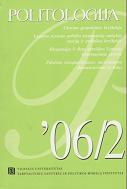Lietuvos užsienio politika tarptautinių santykių teorijų ir praktikų kryžkelėje
Lithuanian Foreign Policy on the Cross-road of Theories and Practice
Author(s): Nortautas Statkus, Kęstutis PaulauskasSubject(s): Politics / Political Sciences
Published by: Vilniaus universiteto leidykla & VU Tarptautinių santykių ir politikos mokslų institutas
Summary/Abstract: In 2004 Lithuania implemented its two most important foreign policy goals – became the member of the European Union and NATO. However, the country will now have to assert its status and position in the Euroatlantic community of liberal democracies. Lithuania faces an arguably more complex agenda, which has no clear end-goals or deadlines. The security challenges are difficult to identify and predict as both the global and European strategic environment is best characterised by an ever-growing uncertainty: the transatlantic relations continue to be tense, Russia, paradoxically, is balancing between perspective of disintegration and reemerging as an expansionist imperial power, and the European Union is undergoing one of the most severe internal crisis in decades. The artcile consists of two parts. In the first part, the authors address the current state of affairs in the two schools of international relations: rationalism (neorealism) and reflectivism (constructivism). In the second part, the authors interchangeably explore and compare the policy options that can be derived from the two different worldviews. The article concludes that international politics for a small state are more complex than either of the schools would suggest. Although the nature of the world politics is increasingly postmodern, a lot of actors still live in a modern world of geopolitics. Lithuanian decision makers will therefore have to “play” in accordance with postmodern rules when possible, but to remember geopolitics if necessary.
Journal: Politologija
- Issue Year: 2006
- Issue No: 2(42)
- Page Range: 12-61
- Page Count: 50
- Language: Lithuanian

